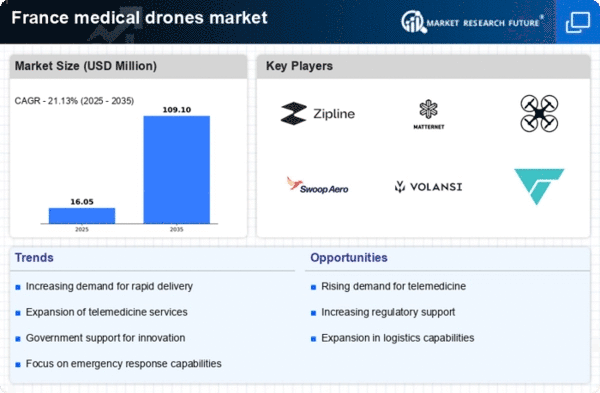Support from Government Initiatives
Government initiatives aimed at promoting innovation in healthcare logistics are significantly influencing the medical drones market. In France, various public policies and funding programs are being implemented to encourage the development and deployment of drone technology in the medical sector. These initiatives often focus on enhancing regulatory frameworks, ensuring safety, and fostering collaboration among stakeholders. As a result, the medical drones market is likely to see increased investment and research opportunities, which could lead to advancements in drone capabilities and applications. The proactive stance of the government may also help to alleviate concerns regarding airspace regulations, further facilitating the growth of this market.
Cost-Effectiveness of Drone Operations
Cost considerations are becoming increasingly relevant in the medical drones market. Drones offer a more economical alternative to traditional transportation methods, particularly in rural areas where road infrastructure may be lacking. The operational costs associated with drone deliveries are often lower than those of ground vehicles, especially when factoring in fuel and maintenance expenses. A recent analysis suggests that utilizing drones can reduce delivery costs by up to 30%, making them an attractive option for healthcare providers. This cost-effectiveness is likely to drive further investment and adoption of drone technology in the medical sector, thereby enhancing the overall efficiency of healthcare delivery systems in France.
Integration with Telemedicine Services
The integration of medical drones with telemedicine services is emerging as a pivotal driver in the medical drones market. As telemedicine continues to gain traction, the need for efficient logistics to support remote consultations becomes paramount. Drones can facilitate the swift delivery of diagnostic tools and medications directly to patients' homes, thereby enhancing the telemedicine experience. This synergy not only improves patient outcomes but also expands the reach of healthcare services. The medical drones market is likely to benefit from this trend, as healthcare providers increasingly recognize the value of combining drone technology with telehealth solutions to optimize patient care in France.
Growing Public Awareness and Acceptance
Public awareness and acceptance of drone technology are critical factors driving the medical drones market in France. As citizens become more informed about the benefits of drones in healthcare, including faster delivery of medical supplies and improved access to care, their willingness to embrace this technology increases. Educational campaigns and successful pilot programs have contributed to a positive perception of drones among the public. This growing acceptance is likely to encourage healthcare providers to adopt drone solutions more readily, thereby expanding the market. The medical drones market may continue to thrive as public confidence in drone operations strengthens, paving the way for broader applications in the healthcare sector.
Rising Demand for Rapid Medical Delivery
The medical drones market in France experiences a notable surge in demand for rapid medical delivery services. This trend is driven by the need for timely access to medical supplies, particularly in remote or underserved areas. The ability of drones to transport essential items such as blood, vaccines, and medications within minutes can significantly enhance healthcare outcomes. Recent studies indicate that the market is projected to grow at a CAGR of approximately 15% over the next five years, reflecting the increasing reliance on drone technology for medical logistics. As healthcare providers seek to improve efficiency and reduce delivery times, the medical drones market is poised to play a crucial role in transforming the landscape of medical supply chains in France.





















Leave a Comment